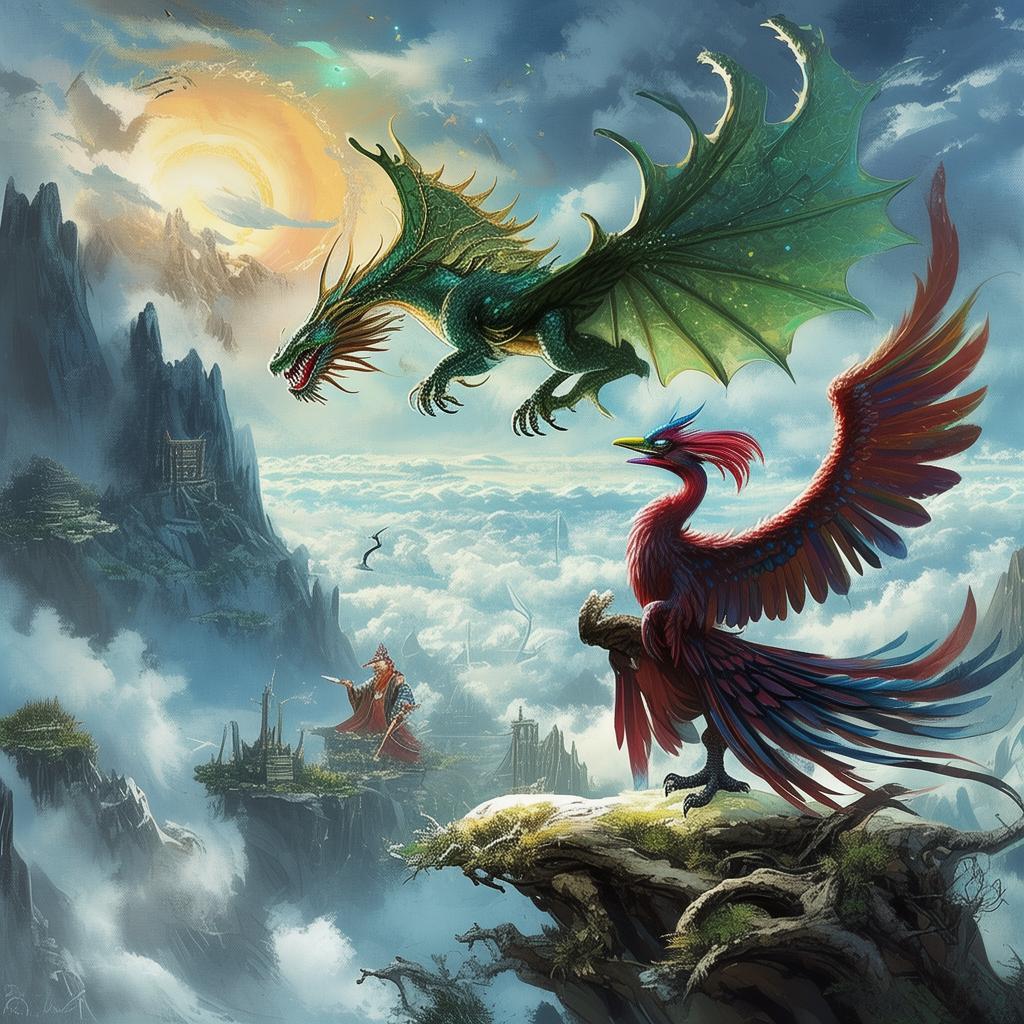Whispers of the Forbidden Threads: A Fuzhu's Quest in the Labyrinth of the Mountainous Silk
In the heart of the ancient Chinese mythology, where the world of the living merged with the realm of the divine, there lived a Fuzhu, a being of both human and mountain spirit. Known for their connection to the mountains and their mastery of silk, Fuzhus were revered for their ability to weave the Mountainous Silk, a fabric so rare and powerful that it could mend the rift between the heavens and the earth.
The tale begins in the village of Lingyuan, nestled between towering peaks and hidden valleys. The Fuzhu, named Miao, was a skilled weaver who had always been drawn to the legends of the Mountainous Silk. It was said that the fabric was woven from the threads of the divine, spun from the very essence of the mountains themselves. Only one Fuzhu in a generation was chosen to embark on the quest to retrieve the Forbidden Threads, and Miao felt an inexplicable pull towards this destiny.
One evening, as the moon hung low and the stars whispered secrets, Miao received a vision. The spirit of the ancient Mountainous Silk revealed itself to her, a shimmering entity that spoke in the language of the wind and the mountains. It beckoned Miao to the labyrinthine cave of the Mountainous Silk, hidden deep within the heart of the forbidden mountains.
The cave was a labyrinth of stone and shadow, a place where time itself seemed to bend and twist. Miao, armed with nothing but her wits and her courage, ventured into the darkness. The cave was alive with the whispers of the past, the echoes of Fuzhus who had failed and the spirits of the mountains that guarded the secret of the Forbidden Threads.
As Miao navigated the maze, she encountered the first of her trials. A creature of stone and shadow, the Guardian of the First Passage, blocked her path. It spoke in riddles and demanded proof of her worth. With a thread of silk in hand, Miao wove a tapestry of her life, showing the Guardian her dedication and love for her craft. The creature, moved by her sincerity, allowed her to pass.
Each passage of the labyrinth presented a new challenge, each trial a reflection of Miao's innermost fears and desires. She faced the Mountainous Serpent, a guardian of the second passage, which demanded a sacrifice of her pride. Miao, realizing that pride was the thread that bound her to the past, offered it freely, and the serpent's scales shimmered into the silk, reinforcing her resolve.

In the third passage, she encountered the Great Mountain, a representation of the mountains' ancient wisdom. The Mountain spoke of the interconnectedness of all life and the importance of balance. Miao listened, understanding that her quest was not just about retrieving the silk but also about understanding the balance between the mountains and the world beyond.
Finally, in the heart of the labyrinth, Miao stood before the final guardian, the Mountainous Silk itself. It was a shimmering tapestry of colors and textures, a living entity that seemed to pulse with the heartbeat of the earth. The Mountainous Silk spoke of the threads of fate and the choices that shape a person's destiny. It asked Miao to choose between the power of the silk and the life she knew.
Miao, reflecting on her journey, realized that the true power of the Mountainous Silk was not in its ability to mend the heavens, but in its ability to transform the weaver. She chose the path of transformation, and the Mountainous Silk accepted her choice. It enveloped her in its embrace, and she emerged a changed being, her spirit woven into the very fabric of the silk.
As Miao returned to her village, the Mountainous Silk in her possession, she discovered that the fabric was more than just a gift. It was a symbol of her transformation, a testament to her courage and her journey. The villagers, seeing the change in her, began to weave the silk into their own lives, using it to heal and to bind together the community.
The tale of Miao and the Mountainous Silk spread far and wide, becoming a legend that would be told for generations. And so, the Fuzhu's quest for the Forbidden Threads became a story of transformation, of the power of choice, and of the enduring connection between the mountains and the people who lived among them.
✨ Original Statement ✨
All articles published on this website (including but not limited to text, images, videos, and other content) are original or authorized for reposting and are protected by relevant laws. Without the explicit written permission of this website, no individual or organization may copy, modify, repost, or use the content for commercial purposes.
If you need to quote or cooperate, please contact this site for authorization. We reserve the right to pursue legal responsibility for any unauthorized use.
Hereby declared.








